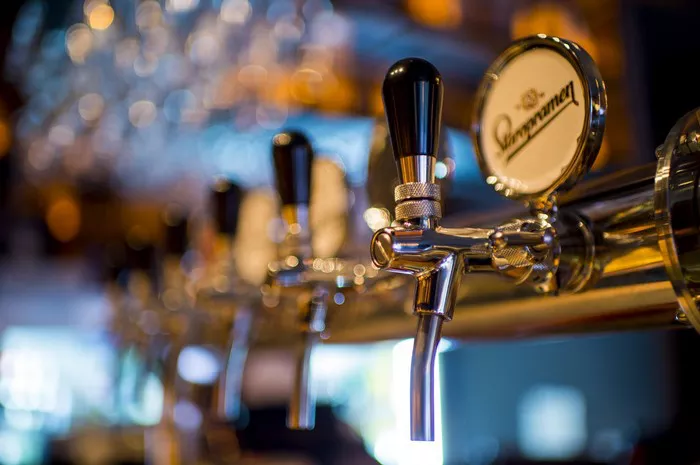After a rigorous workout session, the idea of rewarding yourself with a cold, refreshing beer might seem tempting. But is indulging in this beverage after exercise really a good idea? This article delves into the potential effects of drinking beer post-workout, considering both the positives and negatives. Let’s examine this matter closely to make an informed decision.
Pros of Drinking Beer After a Workout:
1. Rehydration Potential:
Beer, often celebrated as a social drink, contains a significant amount of water. Studies suggest that light to moderate beer consumption may contribute to rehydration due to its water content. This could be particularly beneficial if you’ve sweated heavily during your workout.
2. Carbohydrate Refueling:
Certain types of beer contain carbohydrates that can help replenish glycogen stores in muscles. Glycogen is a primary source of energy during workouts. Opting for beers with complex carbohydrates might provide a modest post-workout energy boost.
3. Relaxation and Stress Reduction:
Moderate beer consumption has been linked to relaxation and stress reduction. After an intense workout, a beer might help you unwind and reduce cortisol levels. However, moderation is key here, as excessive alcohol can have the opposite effect.
4. Social Interaction:
Sharing a beer with friends after a workout can enhance your social experience. Engaging in positive social interactions positively impacts mental well-being, which complements the mood-boosting effects of exercise.
Cons of Drinking Beer After a Workout:
1. Impaired Recovery:
Alcohol consumption can hinder the recovery process by interfering with muscle protein synthesis. This could potentially delay your post-workout recovery and muscle growth.
2. Dehydration Risk:
While beer does contain water, it also has diuretic properties that might increase the risk of dehydration. This is counterproductive, especially when your body is in need of rehydration after sweating.
3. Nutritional Imbalance:
Most beers lack essential nutrients that your body requires after a workout, such as quality protein and essential vitamins. Opting for nutrient-rich post-workout snacks or meals is a wiser choice.
4. Empty Calories:
Beer is relatively calorie-dense, and excessive consumption can contribute to weight gain. If weight management is one of your fitness goals, post-workout beer intake should be carefully monitored.
5. Interference with Sleep:
Alcohol consumption, even in moderation, can disrupt sleep patterns. Quality sleep is crucial for recovery, so consuming beer too close to bedtime might negatively impact your overall fitness progress.
Conclusion:
In the ongoing debate about whether drinking beer after a workout is a good idea, the answer lies in moderation and personal goals. While some potential benefits exist, the drawbacks, particularly concerning recovery and hydration, cannot be ignored.
FAQs related to Drinking Beer :
Q1: Can drinking beer after a workout help with rehydration?
A: Yes, some research suggests that beer’s water content could contribute to rehydration. However, it’s important to note that the diuretic properties of alcohol might counteract this benefit. To effectively rehydrate after a workout, water remains the best choice.
Q2: What role do carbohydrates in beer play in post-workout recovery?
A: Certain beers contain carbohydrates that can help replenish glycogen stores in muscles, providing a minor energy boost after a workout. However, these carbohydrates might not be as efficient as those from nutrient-dense foods like fruits or grains.
Q3: Does moderate beer consumption help with relaxation after exercise?
A: Yes, moderate beer consumption has been associated with relaxation and stress reduction due to its potential to influence neurotransmitters. Yet, excessive alcohol intake can have adverse effects on mental and physical well-being.
Q4: Can drinking beer impair muscle recovery and growth?
A: Yes, alcohol consumption, even in moderate amounts, can interfere with muscle protein synthesis, potentially delaying post-workout recovery and muscle growth. It’s advised to limit alcohol intake during recovery periods.
Q5: Does beer’s diuretic effect increase the risk of dehydration after a workout?
A: Yes, alcohol’s diuretic properties can indeed increase the risk of dehydration after exercise. While beer does contain water, its diuretic effect might counterbalance the hydration benefit.
Q6: Are there specific types of beer that are better for post-workout consumption?
A: If you’re considering drinking beer after a workout, opt for lighter beers with lower alcohol content. These beers generally contain fewer calories and might have a milder diuretic effect.
Q7: Can drinking beer interfere with sleep, affecting post-workout recovery?
A: Yes, alcohol consumption can disrupt sleep patterns, which can negatively impact recovery. Quality sleep is crucial for muscle repair and overall well-being, so it’s wise to avoid alcohol close to bedtime.
Q8: Does beer provide any nutritional value for post-workout recovery?
A: While beer does contain some nutrients, it lacks essential components like quality protein and essential vitamins that are necessary for optimal post-workout recovery. Choosing nutrient-rich foods is a more effective strategy.
Q9: Can drinking beer hinder weight loss efforts after a workout?
A: Yes, beer is relatively calorie-dense, and excessive consumption can contribute to weight gain. If weight management is a concern, it’s advisable to consider the caloric content of your post-workout choices, including beverages.
Q10: Are there alternatives to beer for post-workout relaxation?
A: Absolutely, if you’re looking for ways to relax after a workout, alternatives like herbal teas, infused water, or even light fruit juices can provide a refreshing and hydrating option without the potential drawbacks of alcohol.


